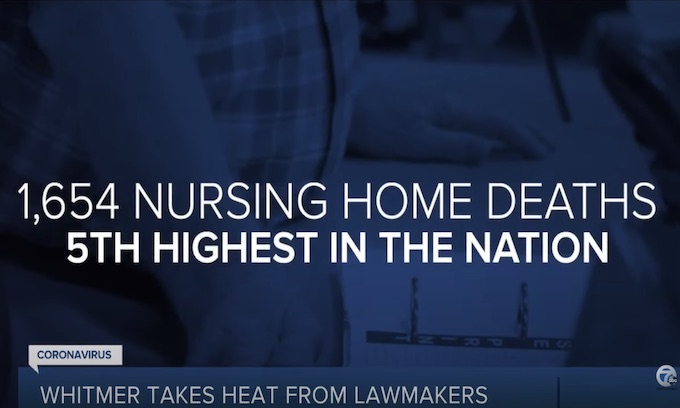Republican lawmakers pushed back against Gov. Gretchen Whitmer’s criticism of the federal response to the coronavirus pandemic when she testified Tuesday to a U.S. House subcommittee about Michigan’s response.
And they challenged Whitmer about her own response to COVID-19 in Michigan nursing homes, where federal data released Monday shows that, as of May 24, Michigan had 1,654 nursing home deaths — the fifth-highest per capita in the nation and more than 200 higher than the number reported by state officials.
Whitmer, a Democrat, testified remotely from Lansing to a U.S. House subcommittee on energy and commerce oversight and investigation, which is taking testimony on state responses to the COVID-19 pandemic.
The hearing, which also featured testimony from Colorado Gov. Jared Polis, a Democrat, and Arkansas Gov. Asa Hutchinson, a Republican, lasted three hours. Republican questions to Whitmer were much more pointed than the ones they directed at Polis.
Whitmer, a national co-chair of former Vice President Joe Biden’s Democratic presidential campaign, has clashed frequently with President Donald Trump over the federal response to COVID-19. Trump has criticized Whitmer on Twitter and in media statements, a development that has raised Whitmer’s national profile.
While expressing appreciation for federal help received, and saying some aspects of federal assistance has improved, Whitmer repeated earlier criticism about a lack of federal coordination and direction in securing personal protective equipment, ventilators, testing equipment, and other supplies.
Early on, “as the state pursued PPE on the national and international markets, the lack of centralized coordination at the federal level created a counterproductive competition between states and the federal government to secure limited supplies, driving up prices and exacerbating existing shortages,” Whitmer said in her prepared testimony.
And today, a lack of federal coordination related to testing equipment means Michigan has been unable to meet its full testing capacity, recently reaching about 15,000 tests per day when it could be doing about 25,000 per day, Whitmer said. Swabs remain in short supply, she said.
But U.S. Rep. David McKinley, R-West Virginia, pushed back on Whitmer’s criticism, noting that while criticizing the Trump administration for a lack of support, Whitmer did not ask the Federal Emergency Management Agency for a federal disaster declaration until March 26, after the omission had been reported by the Free Press.
“Do you regret not acting sooner?” asked McKinley, noting that several states had applied and been approved for the declaration triggering federal assistance before Michigan even made an application.
Whitmer did not respond to that in answering McKinley’s question, which also dealt with other topics, saying: “I’m not going to go toe to toe with you on every allegation.”
Previously, she has said Michigan wanted to learn from applications filed by other states and was more focused on taking steps in Michigan to prevent the spread of the disease.
Republicans also pressed Whitmer on nursing homes.
On May 20, Whitmer issued an executive order mandating that nursing homes make “all reasonable efforts” to create units dedicated to residents with the coronavirus, provide appropriate personal protective equipment to staff working in the units, and not accept COVID-19 patients unless they have dedicated isolation units for such patients.
“Why did it take you so long to change the policy … of putting COVID patients back in nursing homes?” asked U.S. Rep. Tim Walberg, a Michigan Republican from Tipton.
Whitmer said that in retrospect, there are “probably a number of decisions we would have made some adjustment on.”
But, “we were working with the best counsel of our public health experts,” she said. Also, Michigan’s experience with the coronavirus has been different from other states because of the exponential growth in cases experienced in metro Detroit.
McKinley cited Michigan’s high number of nursing home deaths and asked why Michigan has not instituted mandatory testing of all nursing home residents and employees, as he said some other states have done.
Whitmer said Michigan’s high death rate may be partly the result of differences in the way COVID-19 deaths are being recorded in various states. She said that in some other states, some deaths, in which pneumonia was listed as the cause, may have, in fact, been coronavirus deaths.
___
(c)2020 the Detroit Free Press
Visit the Detroit Free Press at www.freep.com
Distributed by Tribune Content Agency, LLC.
—-
This content is published through a licensing agreement with Acquire Media using its NewsEdge technology.



















Recent Comments